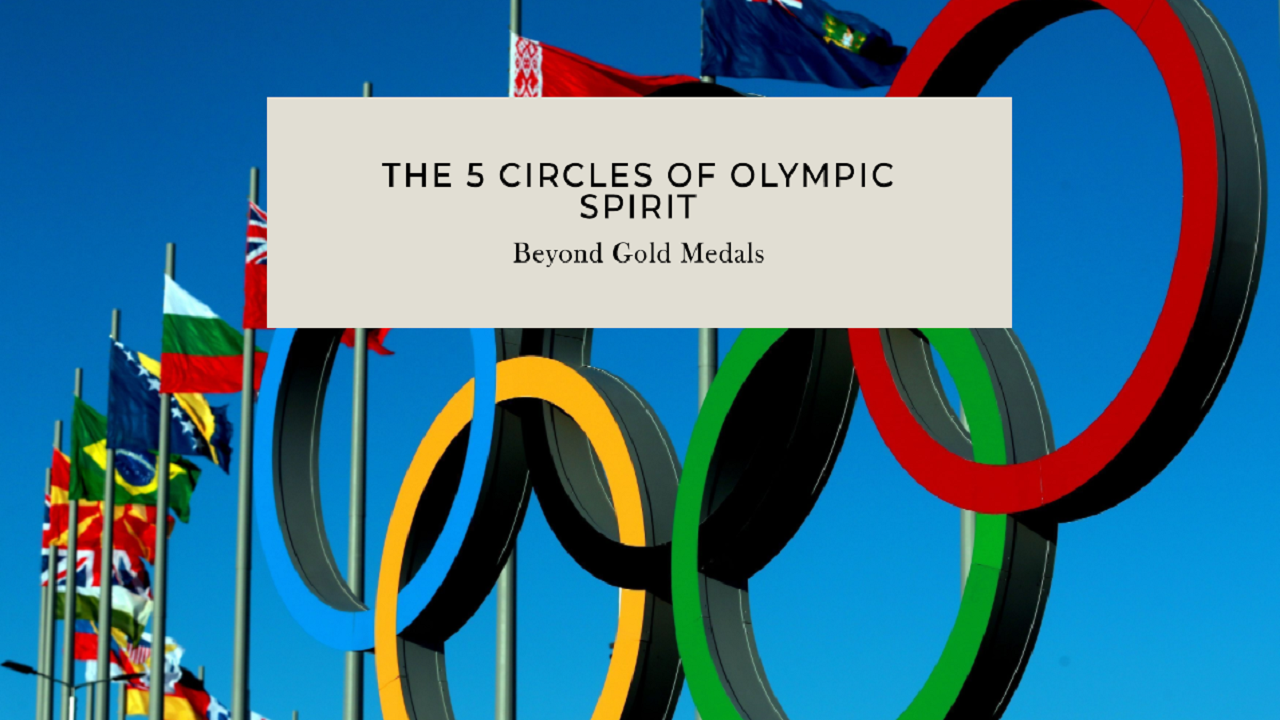Beyond Gold Medals: Understanding the 5 Circles of Olympic Spirit
Delve into the captivating history of the Olympics and discover the essence that goes beyond gold medals—the Olympic spirit. Explore the origins of the Games, the revival of the modern Olympics, and the symbolism behind the iconic Olympic rings. Uncover the five circles of the Olympic spirit, which encompass excellence, respect, friendship, unity, and legacy. This blog reveals how the Olympic spirit unites nations, fosters sportsmanship, and leaves a lasting impact on both host cities and the world. Join us in celebrating the power of the Olympics to inspire and bring people together.

The Olympics, often hailed as the greatest sporting event on Earth, captivate the world with their grandeur and athletic prowess. While the gold medals symbolize victory, there is a deeper essence that binds nations, athletes, and spectators together—the Olympic spirit. Beyond the glitz and glamour lies the embodiment of human perseverance, unity, and cultural exchange. In this blog, we delve into the history, significance, and five core principles that define the Olympic spirit.
The Origin of the Olympics
The ancient Olympic Games originated in Olympia, Greece, around 776 BCE. Held to honor the Greek god, Zeus, the Games were a celebration of physical strength, skill, and endurance. Initially, they encompassed only one event, a short sprint called the "stadion." Over time, additional events were added, including discus throwing, long jump, and chariot racing. These ancient Games provided a platform for friendly competition and were a testament to the human spirit.
The Revival of the Modern Olympics
After a hiatus of over 1,500 years, the modern Olympic Games were reintroduced in 1896 by Pierre de Coubertin. Inspired by the ancient Greek tradition, Coubertin aimed to foster international goodwill through sports. The modern Olympics symbolized unity and peace among nations, transcending political boundaries. With the first Games held in Athens, the Olympic spirit was reignited and soon became a global phenomenon.
The Olympic Rings and Their Symbolism
One of the most recognizable symbols of the Olympics is the five interlocking rings. Designed by Coubertin, these rings represent the unity of the five continents: Africa, the Americas, Asia, Europe, and Oceania. Each ring is a different color—blue, yellow, black, green, and red—and represents the diversity and global reach of the Olympic movement. The Olympic rings have become a visual representation of the shared Olympic spirit that unites athletes and spectators worldwide.
The Five Circles of Olympic Spirit:
-
Excellence: The pursuit of excellence is at the heart of the Olympic spirit. Athletes from around the world strive to reach their highest potential, pushing the boundaries of human capability. Through years of training, dedication, and sacrifice, they showcase the epitome of athletic achievement, inspiring generations to overcome obstacles and reach for greatness.
-
Respect: Respect for oneself, fellow athletes, and the rules of fair play is a fundamental principle of the Olympics. Regardless of nationality, race, or gender, athletes compete on an equal playing field. The Olympic spirit encourages sportsmanship, fostering an environment where mutual respect and admiration prevail.
-
Friendship: The Olympics provide a unique platform for forging friendships across borders. Athletes from diverse backgrounds come together, transcending cultural differences and language barriers. The spirit of camaraderie and friendship cultivated during the Games extends far beyond the competition, fostering lasting connections that strengthen global unity.
-
Unity: The Olympics serve as a symbol of unity, emphasizing our shared humanity. When athletes parade under their respective national flags during the Opening Ceremony, it is a powerful reminder that despite our differences, we are all part of a greater global community. The Olympic spirit promotes harmony, encouraging collaboration and understanding among nations.
-
Legacy: The Olympic spirit leaves an enduring legacy. Host cities invest in infrastructure, facilities, and programs that benefit their communities long after the Games conclude. The Olympic movement also promotes social change, advocating for inclusivity, equality, and sustainability. Through education and grassroots initiatives, the Olympic spirit inspires positive transformations worldwide.
Conclusion
Beyond the allure of gold medals and record-breaking performances, the Olympic spirit serves as a testament to the power of sports in transcending boundaries and bringing people together. Rooted in history and fueled by the core principles of excellence, respect, friendship, unity, and legacy, the Olympic spirit embodies the triumph of the human spirit. It reminds us that beyond physical competition lies a higher purpose—a celebration of our shared humanity and the possibility of a brighter future. Let us embrace the Olympic spirit and continue to be inspired by the Games for generations to come.
ALSO READ
Tiger Woods Prioritizes Community Amidst Fires Over Genesis Invitational
Kevin Neo: Pioneering Healthcare Solutions and Community Engagement
Meta's New Policies Spark Concern Among LGBTQ+ Community
Farmers Rally for Dallewal: Unity Amidst Fast-unto-Death Protest
Baloch Leader Calls for Unity Amid Alleged State Repression










